(The content below was transcribed from an interview done with Acacia Law. We think you’ll find it much easier
and more enjoyable to read this way.)
Interviewer: Can you tell us about a recen tcase in which you successfully defended a client?
Acacia Law: One I have been working on for about 14 months is an armed robbery case originally in the hands of the public defender. My client got involved with three gang members. She thought they were going over to her friend’s house to pick up a tattoo gun and some crystal meth, just to party with.
Well, when my client and the other girl went there they did not know the two guys they were with had actually followed them. They went in to borrow the tattoo gun and get some meth, just for personal use. As they were leaving, the two men came in with real handguns and robbed the place. Then, they sent someone to my client’s house. She was told if she said anything they would kill her.
They wanted her to do 12 1/2 years for armed robbery because they considered her a co-conspirator. They tried to make it seem she was head of the little criminal enterprise; even though she is not a gang member and the other three are. In fact, the others are itemized gang members by the gang unit.
The bottom line is, after 14 months and doing interviews, I put pressure on the state. I forced them to give pleas to the two co-defendants. One had so many charges he just took 12 1/2 or 14 years. The other guy did a “free talk.” The other woman who was there also did a “free talk.” However, after her “free talk,” I did an extensive interview with her.
Interviewer: What does “free talk” mean?
Acacia Law: “Free talk” means they made a deal with the state to testify on behalf of the state, against their co-defendants who were not pleading. The only one not pleading was my client. I would not plead her guilty to something she did not do.
It was left to me to do the interviews and make her case. It required extensive work because the state was very much dead opposed to giving her any probation, or anything. The state wanted her to go to prison.
Then, after I did some damage to their case by doing interviews and pointing out the obvious, they modified it to make her probation-eligible. However, she would have to go to jail. Finally, last month I got them to agree to give her what is called a “no agreement.” This means she does not have to do any jail time.
The judge can simply give her probation and no jail. Also, instead of pleading to armed robbery, she pled to burglary in the second degree. That means she went into a residence of another person with the intent to commit a crime. The crime was to try to obtain dangerous drugs. In this case, it was crystal methamphetamine.
Again, instead of pleading to armed robbery, all she pled to was burglary in the second degree. Burglary does not require that you steal anything. All it means is that you enter into a residence with the intent to commit a felony.
Since possession of dangerous drugs is a class IV felony in this state, I was able to make a factual basis for her to take a plea in this case. 12 1/2 years to being probation-eligible, without the requirement of jail, is a huge drop.



